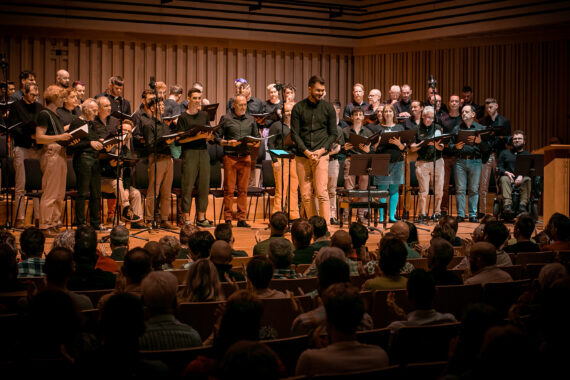Pride in Every Note: The Sunday Boys Celebrate 50 Years of Queer Stories on Stage

Manchester’s summer of sound is in full swing, with the whole city having geared up to celebrate Oasis’ highly anticipated reunion and all the incredible live music performances our city is famous for. We’re no exception at Stoller Hall, and this summer will see us hosting standout performers and world-class music summer schools in our award-winning concert hall. On Saturday 26 July, we’re delighted to welcome back Manchester’s very own LGBTQ+ low-voice choir, The Sunday Boys, for an incredible heartfelt celebration of queer voices in musical theatre. Ahead of their performance, we spoke to The Sunday Boys’ Communications Lead, Michael Amatt, to find out what to expect at the show, and how queer representation on stage has shifted since the groundbreaking 1975 musical A Chorus Line.
Tell us about The Sunday Boys! What’s your story, and what’s the driving force behind your work?
The Sunday Boys is Manchester’s LGBTQ+ low-voice choir, open to anyone singing tenor or bass in an inclusive, friendly environment. Founded in January 2016 by Michael Betteridge, the choir’s mission is simple yet profound: to create a safe space for queer voices to learn, perform and build community through music. The choir offers a range of unique projects for its members, regularly commissions new LGBTQ+ works, and tours nationally and internationally.
Your upcoming concert explores 50 years of queer stories on stage. How did this idea come about, and how was the programme selected?
Queers on Stage charts queer stories in musical theatre from the landmark 1975 show A Chorus Line through to modern hits like Everybody’s Talking About Jamie. The idea grew from a desire to highlight how musicals have reflected queer lives, from early representation to contemporary celebration. The choir will perform iconic and meaningful numbers like “One” (A Chorus Line), “I Am What I Am” (La Cage aux Folles) and “Seasons of Love” (Rent). These songs have offered visibility and pride to LGBTQ+ audiences across generations.
The show celebrates musical theatre since the opening of the 1975 show A Chorus Line. Why is this show such a meaningful starting point for your timeline?
A Chorus Line premiered off Broadway in 1975 and marked a true turning point for queer visibility on stage. Its song “I Can Do That” features an openly gay character, and the musical authentically explores the hopes and struggles of performers including queer experiences, something rare for its time. This bold honesty makes it a fitting starting point for a 50-year journey of queer storytelling in musical theatre.
Musical theatre has long had a close connection with LGBTQ+ culture. How has queer representation on stage evolved over this 50-year time span?
Over the past five decades, representation has evolved dramatically. In the 1970s, we saw subtle queer stories emerge, but these were often cloaked in coded language or buried subtext. The ‘80s saw shows like La Cage aux Folles debuting some of the first bold expressions of queer culture, such as drag, on Broadway. Then in the ‘90s and 2000s, shows like Rent brought queer narratives and awareness directly to the stage. And since the 2010s, musicals such as Fun Home, Everybody’s Talking About Jamie and The Prom have celebrated queer identity front and centre, offering joy and affirmation, not just struggle. Queers on Stage follows this journey, showing how songs have shifted from hidden narratives to open celebration of LGBTQ+ lives.
Is there a particular song that the group loves performing from this programme? Which one is it, and what makes it a favourite?
We’re a diverse bunch so each song speaks differently to everyone. However, “Louder than Words” from Jonathan Larson’s Tick, Tick… Boom! feels particularly pertinent given the government’s anti-trans rhetoric. The song’s lyrics, as the title suggests, push the listener to do more than just use words to foster change, but to act, even though that can often be the harder choice.
And lastly, how do you hope the audience will feel when they leave the performance?
We’re aiming for a vibrant, celebratory night! By weaving together 50 years of queer storytelling, we want audiences to leave feeling seen, uplifted and inspired. We want to show them how far representation has come and give them hope about where it’s going next. And with our fantastic choir’s lively harmonies and heartfelt performances, it will be a truly unforgettable evening.
We love the sound of that! Join us on Saturday 26 July to celebrate 50 years of queer representation on stage with all the unique harmonies and heart The Sunday Boys are known for.

